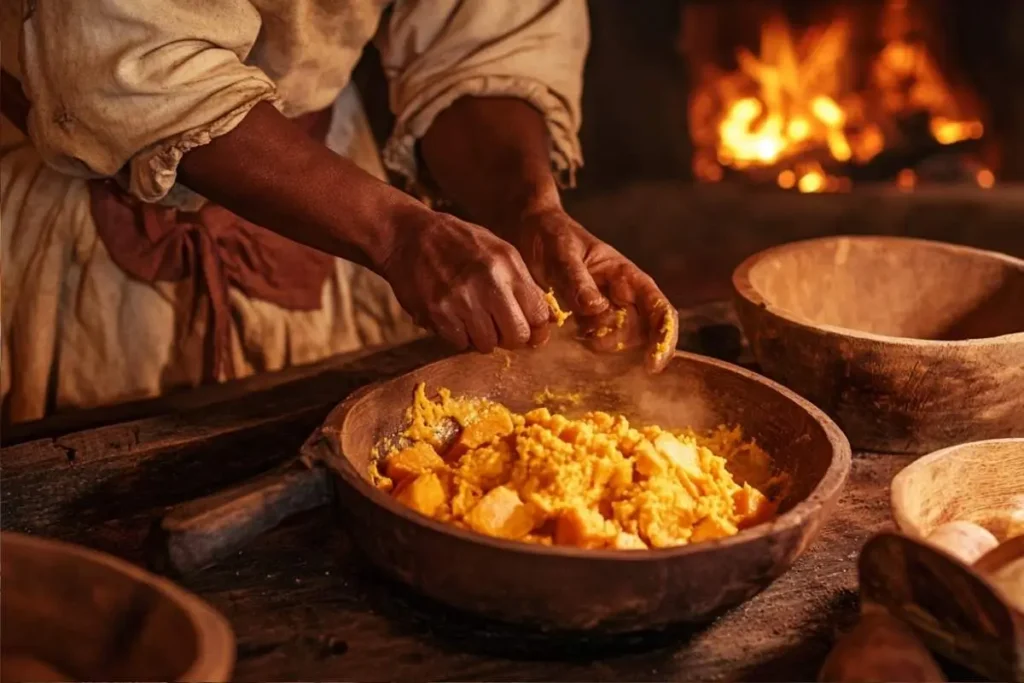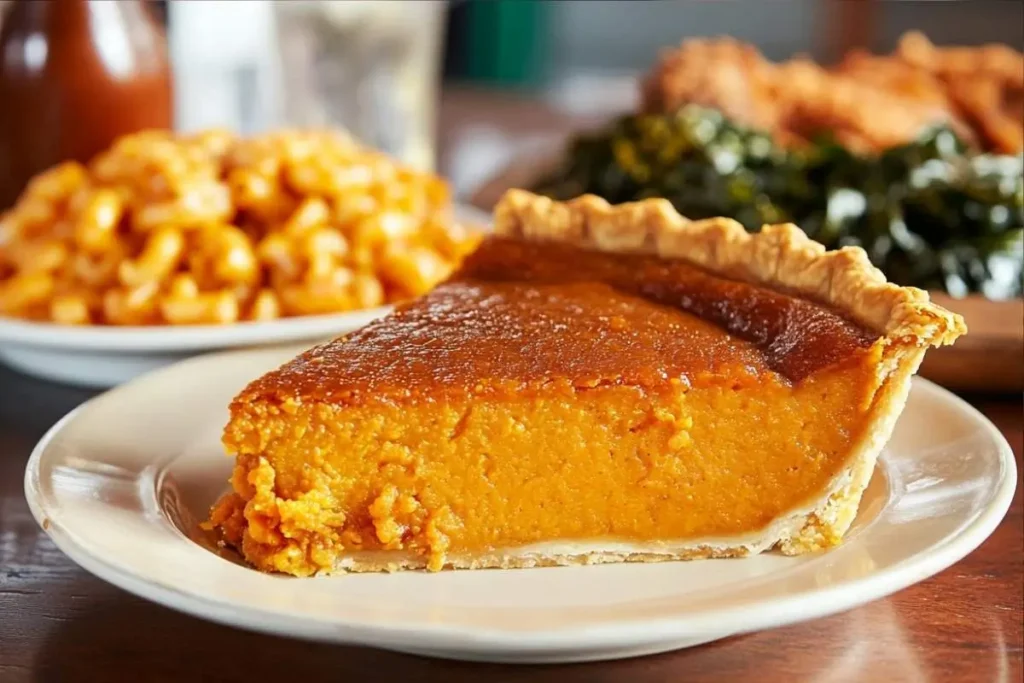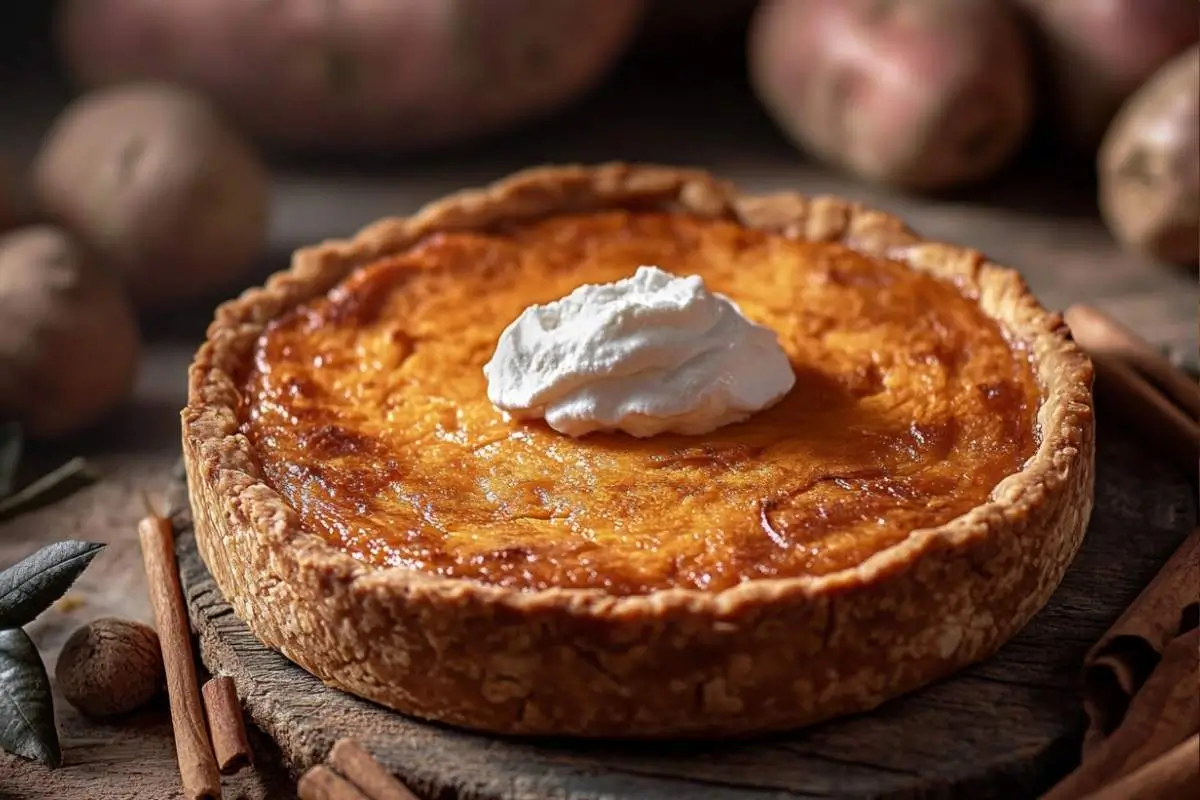Sweet potato pie is more than a dessert—it’s a symbol of Black food culture, deeply tied to African American heritage and the soul food tradition. But why is sweet potato pie a Black thing? This dish, rooted in history, continues to bring families together across generations.
While pumpkin pie dominates many American Thanksgiving tables, sweet potato pie has been a staple in Black households for centuries. Rooted in the history of enslaved Africans in America, this dish evolved into a symbol of heritage, comfort, and celebration.
In this article, we’ll explore its history, cultural impact, and how it differs from pumpkin pie. Plus, we’ll share a classic recipe to try at home!
Why Is Sweet Potato Pie a Black Thing? The Role of Sweet Potato Pie in Black Food Culture
Why is sweet potato pie a Black thing? This iconic African American dessert has deep ties to Black history, resilience, and the legacy of soul food traditions.
How It Became a Black Food Staple
✔ Rooted in Enslaved African Cooking – Sweet potatoes were more accessible than pumpkins, making them the natural choice for Black cooks.
✔ Tied to Southern Black Culture – It became a staple in soul food cuisine, passed down through generations.
✔ More Flavorful & Richer than Pumpkin Pie – Naturally sweeter, creamier, and spiced with warm flavors like cinnamon and nutmeg.

Why It’s a Must-Have at Black Celebrations
✔ Thanksgiving & Christmas – A dish passed down for generations, rich in Black family traditions.
✔ Church Gatherings & Sunday Dinners – A symbol of fellowship and community bonding.
✔ Juneteenth Celebrations – Representing freedom, resilience, and culinary heritage.
💡 Fun Fact: Sweet potato pie is often served with fried chicken, collard greens, and mac & cheese—classic soul food staples!
The African Influence on Sweet Potato Pie
The origins of sweet potato pie history in soul food traditions trace back to West Africa, where yams were a staple food. But when enslaved Africans arrived in America, they had to adapt to new ingredients.
From Yams to Sweet Potatoes: A Culinary Adaptation
In West Africa, yams were commonly used in both savory and sweet dishes, much like sweet potatoes are today. However, traditional African yams weren’t readily available in the U.S. Instead, enslaved Africans used sweet potatoes African American desserts after, which had a similar texture and sweetness.
This substitution led to the creation of sweet potato-based dishes, including the early versions of African American desserts. Over time, Black cooks refined the recipe, incorporating butter, sugar, cinnamon, and nutmeg, mirroring the rich, spiced flavors found in traditional recipes.
💡 Fun Fact: The method of roasting and mashing sweet potatoes before baking them into a pie was inspired by traditional African cooking techniques used for making yam-based dishes.
How Enslaved Cooks Influenced Southern Cuisine
The contributions of enslaved Black chefs were instrumental in shaping Southern baking traditions, including the rise of sweet potato pie history as a household favorite.
✔ Many enslaved cooks worked in plantation kitchens, blending African, European, and Native American flavors.
✔ They introduced sweet potatoes, peanuts, okra, and black-eyed peas into soul food traditions.
✔ Over generations, these dishes became deeply rooted in Black cuisine, with sweet potato pie history emerging as a signature dessert in Southern baking traditions.
Unlike pumpkin pie, which was popular among white Southerners and Northern European immigrants, this traditional recipe became a staple in soul food traditions, passed down through generations.
💡 Want to try a nostalgic recipe? Check out our Old Fashioned Sweet Potato Tarts, a modern twist on a classic!
Why Is Sweet Potato Pie a Black Thing? The Cultural Divide vs. Pumpkin Pie
Sweet Potato Pie vs. Pumpkin Pie – A Cultural Divide
While pumpkin pie dominates mainstream holiday tables, African American desserts remain central to Black food culture. But why is sweet potato pie a Black thing? The answer lies in sweet potato pie history, accessibility, and taste preferences.
Why Black Families Prefer Sweet Potato Pie
✔ Southern Availability – Sweet potatoes were abundant and affordable in Black cuisine.
✔ Bolder Flavor & Creamy Texture – Unlike pumpkin, traditional recipes using sweet potatoes offer natural sweetness and richness.
✔ Sweet Potato Pie History – A key dish in soul food traditions, passed down for generations.

How Media & Pop Culture Reinforce the Divide
✔ Pumpkin Pie in Marketing – Grocery stores and brands promote pumpkin desserts as the holiday standard.
✔ Media Representation – Traditional recipes for pumpkin pie are often the default in Thanksgiving TV specials & cookbooks.
✔ Black Chefs Preserving Tradition – Icons like Patti LaBelle and Carla Hall bring African American desserts into the spotlight.
💡 Fun Fact: Patti LaBelle’s soul food traditions went viral in 2015, selling out nationwide and proving the dessert’s undeniable cultural impact!
Sweet Potato Pie in Black Family Traditions
More than just dessert, African American desserts are a symbol of culture, passed down for generations. It’s a staple at Thanksgiving, Christmas, and Sunday dinners, bringing families together through shared recipes and memories.
Why Is Sweet Potato Pie a Black Thing During the Holidays?
✔ Generational Tradition – Many families pass down handwritten traditional recipes, preserving history.
✔ A Symbol of Comfort & Nostalgia – Its warm spices and creamy filling evoke home and celebration.
✔ A Staple in Soul Food Traditions – Served with collard greens, mac & cheese, and candied yams.
Sweet Potato Pie & Family Bonds
✔ Cooking Together – Grandmothers teach younger generations, ensuring Southern baking lives on.
✔ Storytelling Over Dessert – Family history is shared over slices of pie.
✔ A Taste of Home – For those far from family, baking African American desserts is a way to stay connected.
💡 Fun Fact: Some Black families bake multiple pies at once—one for Thanksgiving dinner and another just for breakfast the next morning!
How Sweet Potato Pie Became a Cultural Icon
Sweet Potato Pie as a Cultural Icon
Beyond the home, African American desserts are deeply woven into Black culture, appearing in restaurants, media, and pop culture.
From Soul Food Restaurants to Viral Sensations
✔ Black Cuisine in Restaurants – Famous soul food spots like Sylvia’s (Harlem) & Dooky Chase’s (New Orleans) keep the tradition alive.
✔ Bakeries & Cafés – Many Black-owned bakeries offer traditional recipes year-round.
✔ Patti LaBelle’s Viral Pie – In 2015, her Walmart Southern baking creation sold out nationwide, proving its cultural significance
Sweet Potato Pie in Black Pop Culture
✔ Music Mentions – Featured in songs by Ludacris, James Taylor, and more.
✔ TV & Movies – Appears in classics like Soul Food and The Jeffersons.
✔ Literary Influence – Authors like Maya Angelou highlight soul food traditions in their works.
💡 Fun Fact: Patti LaBelle’s viral pies sold out within hours, leading Walmart to restock them for years!
Want to bring restaurant-quality flavors to your kitchen? Try our Philly Cheesesteak Tortellini for a hearty dinner before dessert!
The Debate – Sweet Potato Pie vs. Pumpkin Pie
One of the biggest cultural food debates is sweet potato pie vs. pumpkin pie. While both are popular fall desserts, sweet potato pie is more closely associated with Black culture, while pumpkin pie dominates mainstream American holiday tables.
But why is sweet potato pie a Black thing, while pumpkin pie is often seen as the default Thanksgiving dessert?
Why Do Black Families Prefer Sweet Potato Pie Over Pumpkin Pie?
The preference for sweet potato pie in Black households has deep historical and cultural roots.
✔ Historical Availability – Enslaved Africans had limited access to pumpkins but had an abundance of sweet potatoes, making them a more practical choice.
✔ Stronger Flavor – Sweet potatoes naturally have a richer, more robust taste compared to the milder flavor of pumpkin.
Beyond their rich, naturally sweet flavor, sweet potatoes also offer significant health benefits. According to the Cleveland Clinic, they contain more fiber and vitamin A than white potatoes, supporting heart health, digestion, and immune function. This makes them a preferred choice in many traditional recipes, including soul food desserts like sweet potato pie.
✔ Soul Food Influence – In Southern Black cuisine, sweet potatoes are already a staple (as seen in candied yams), making sweet potato pie a natural extension.
💡 Want to try both? Compare sweet potato pie and pumpkin pie side by side by baking both for your next holiday meal!
How Sweet Potato Pie Became a Symbol of Black Identity
Beyond taste preference, choosing sweet potato pie over pumpkin pie is a reflection of Black cultural identity and tradition.
✔ A Way to Preserve Ancestral Cooking Traditions – Many Black families take pride in making sweet potato pie from scratch, keeping their culinary roots alive.
✔ A Distinct Alternative to Mainstream Culture – While pumpkin pie is promoted in magazines, commercials, and grocery stores, sweet potato pie represents something unique to Black culture.
✔ The Role of Generational Influence – Many Black children grow up watching their elders bake sweet potato pie, making it a sentimental and nostalgic tradition.
Why is sweet potato pie a Black thing? The answer lies in Black culinary heritage, African American traditions, and the soul food movement. It’s a dish that has withstood history, preserved culture, and strengthened generations of family bonds.
How Sweet Potato Pie Continues to Evolve
As time passes, sweet potato pie remains a beloved tradition, but it’s also evolving with modern tastes and trends. Today, bakers and chefs are reinventing the classic recipe while still honoring its deep cultural roots.
Modern Twists on Traditional Sweet Potato Pie
While the classic sweet potato pie recipe is timeless, modern variations are gaining popularity:
✔ Mini Sweet Potato Tarts – Perfect for portion control and elegant presentations.
✔ Spiced & Infused Pies – Variations with bourbon, maple syrup, or chai spices bring bold new flavors.
✔ Dairy-Free & Vegan Options – Using coconut milk or almond milk makes sweet potato pie accessible for those with dietary restrictions.
💡 Looking for a twist on tradition? Try our Old Fashioned Sweet Potato Tarts for a mini version of this Southern classic!
Sweet Potato Pie in the Future – More Than Just a Dessert
Sweet potato pie is no longer just a holiday dessert—it has expanded into year-round menus, creative recipes, and even health-conscious adaptations.
✔ Sweet Potato Cheesecake – A fusion of two favorites, blending the creamy richness of cheesecake with the spiced sweetness of sweet potato pie.
✔ Gluten-Free Sweet Potato Pie – Using almond flour or oat-based crusts makes it more accessible to gluten-free diets.
✔ Sweet Potato Pie Ice Cream – This flavor is appearing in specialty shops, proving its versatility beyond the pie dish.
As chefs continue to innovate, sweet potato pie remains at the heart of Black food culture, blending tradition with creativity for generations to come.
Looking for another creative way to enjoy sweet potatoes? Discover why soaking sweet potatoes before baking can elevate your dish!
The Cultural Significance of Sweet Potato Pie & Its Lasting Legacy
Sweet potato pie is more than just a dessert—it’s a symbol of history, family, and tradition. But why is sweet potato pie a Black thing? Its roots trace back to West Africa, its evolution happened during slavery, and today, it remains a cultural staple in Black households and businesses.
A Dish That Brings Black Families Together
Sweet potato pie is a centerpiece at many Black family gatherings, from Thanksgiving feasts to Sunday dinners. The tradition of making and sharing this pie has been passed down through generations, creating a strong sense of identity and connection.
✔ A Holiday & Celebration Essential – No Black Thanksgiving, Christmas, or family reunion is complete without sweet potato pie.
✔ A Legacy Passed Down Through Generations – Many families have their own treasured sweet potato pie recipes, often handwritten and carefully guarded.
✔ A Unifying Dish Across Black Communities – Whether enjoyed at a cookout, church event, or family dinner, sweet potato pie is more than just food—it’s a shared experience.
💡 Want to continue the tradition? Try baking a homemade sweet potato pie and share it with your loved ones.
Sweet Potato Pie in Black-Owned Businesses & Modern Culture
Beyond home kitchens, sweet potato pie plays a major role in Black-owned bakeries, restaurants, and soul food establishments. Its cultural impact extends beyond taste—it represents Black entrepreneurship, resilience, and culinary excellence.
✔ A Signature Item in Black-Owned Bakeries – Many soul food restaurants proudly serve sweet potato pie, keeping the tradition alive.
✔ A Symbol of Black Culinary Identity – Chefs and bakers have reimagined classic sweet potato pie, adding new flavors while preserving its roots.
✔ A Dish That Tells a Story – From West African yams to Southern kitchens, sweet potato pie carries a powerful history.
💡 Final Thought: Sweet potato pie isn’t just about ingredients—it’s about legacy, culture, and the enduring strength of Black communities.
FAQs
Many people are curious about the history and significance of sweet potato pie. Here are answers to some of the most frequently asked questions.
1. Is sweet potato pie only popular in Black culture?
Sweet potato pie is deeply rooted in Black food traditions, but it’s enjoyed by people of all backgrounds. Its association with soul food and African American cuisine makes it especially significant in Black culture.
2. How is sweet potato pie different from pumpkin pie?
✔ Flavor – Sweet potato pie has a naturally rich, caramel-like sweetness, while pumpkin pie has a milder, spiced flavor.
✔ Texture – Sweet potato pie is creamier and denser, while pumpkin pie has a slightly lighter consistency.
✔ Cultural Connection – Sweet potato pie is a staple in Black American cuisine, whereas pumpkin pie is more common in mainstream American holiday tables.
3. Why do Black families prefer sweet potato pie over pumpkin pie?
Historically, enslaved African Americans had access to sweet potatoes instead of pumpkins, leading to sweet potato pie becoming a key part of their culinary traditions. The preference continues today, as many Black families grow up eating sweet potato pie as their go-to holiday dessert.
4. How do you make an authentic sweet potato pie?
A traditional sweet potato pie recipe includes:
✔ Mashed sweet potatoes – The base of the pie, providing natural sweetness.
✔ Butter & spices – Cinnamon, nutmeg, and vanilla for warmth and depth.
✔ Evaporated milk or cream – Creates a smooth, custard-like texture.
✔ A buttery crust – Usually made from scratch or a pre-made shortcrust pastry.
Want to try it yourself? Check out our Old Fashioned Sweet Potato Tarts recipe!

